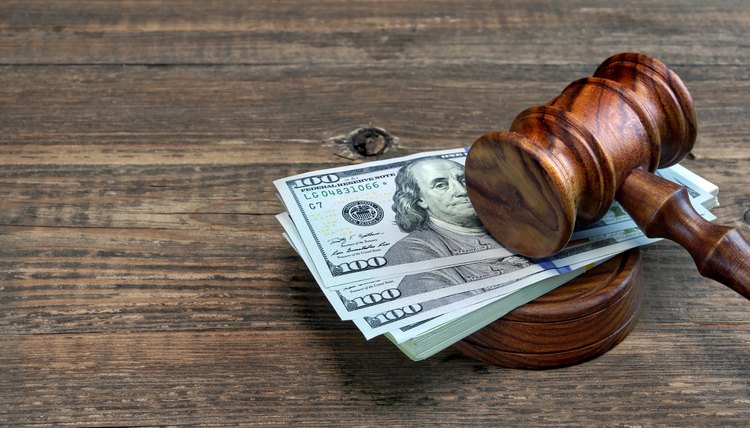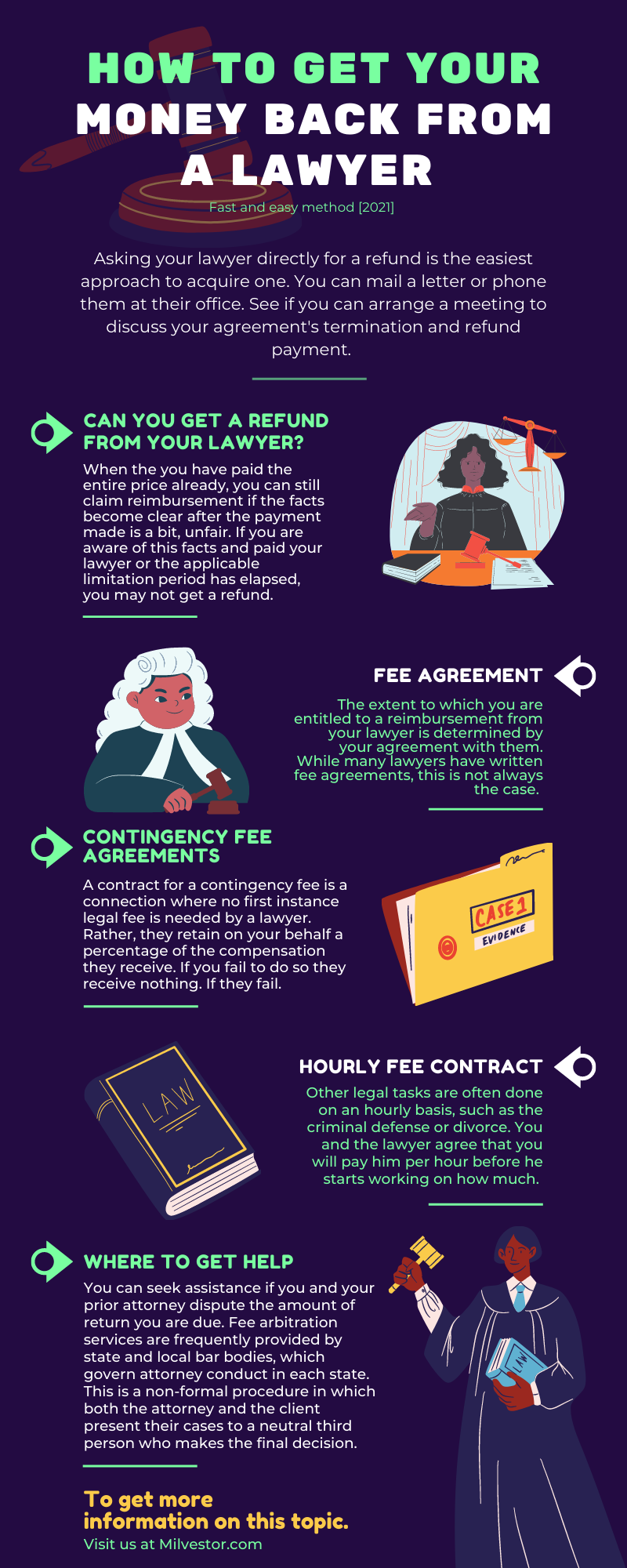
Do you want to know how to get your money back from a lawyer? Unfortunately, some attorney/client relationships fail in the same way that some marriages fail. Because a client has the right to fire her lawyer at any time, ending the partnership is simple; working out the finances can be more challenging.
How to get your money back from a lawyer; asking your lawyer directly for a refund is the most straightforward approach to acquire one. You can mail a letter or phone them at their office. See if you can arrange a meeting to discuss your agreement’s termination and refund payment. Ensure that they return all case files and court records to you, but be aware that you may be charged for them.
The type of fee agreement you signed with the attorney determines whether you are entitled to a refund and the magnitude of that return. Your lawyer is meant to be your lifeline, whether you’re dealing with a creditor or facing criminal charges. Unfortunately, occasionally the client-lawyer relationship deteriorates to the point where you no longer desire their advice. Would you like to learn more about how to get your money back from a lawyer? Continue reading to find out.
How to get your money back from a lawyer
Upon completion of your case, you will be repaid the outstanding unpaid fees. You will want to seek a refund in case of an accounting error, a fee disagreement, or the early conclusion of the retainer arrangement. If you’re going to learn How to get your money back from a lawyer, this is the part where you pay attention.
Client trust accounts have raised ethical headaches for lawyers. For example, if either side terminates the lawyer/client relationship or before the advance is depleted, the lawyer must quickly reimburse the client for the balance.
You must read this thoroughly when signing a retainer agreement because it could say that if you terminate the arrangement early, your fee is non-refundable. Most agreements explain what’s going to happen to unpaid fees.
When you have already paid the total price, you can still claim reimbursement if the facts become apparent after making the payment a bit unfair. However, you may not get a refund if you know these facts and paid your lawyer or the applicable limitation period has elapsed.
The agreement will also establish your responsibilities and what happens when you break the contract requirements. Still, want to know more about How to get your money back from a lawyer? Continue reading to find out.
Recommended: How to Build Wealth | Complete Guide To Building Sustainable Wealth [2021]
Retainer Fee Refund: What you need to know
Know what retainer fees entail is essential to learning how to get your money back from a lawyer. A retainer fee is a payment made to your lawyer or other professional service providers to secure their services for a set period.
During this time, the lawyer must be available to answer any questions you may have about your claim or legal matters. If you decide to end your connection with your lawyer, you can seek a refund, but you will only get a partial return if you have already completed some work.
If the service cost is substantially smaller than initially predicted, you can also receive a refund. In that instance, the money that the lawyer did not spend will be reimbursed.
You must know that two kinds of retention fees exist to receive a reimbursement for your lawyer’s fee:
Earned retainer fees The retainer fee made is a particular part of the retainer that your lawyer has a right to at the start of his employment. The price is paid to the trust fund of the advocate and is usually charged for the job carried out by the hour. It can also be given for legal purposes, supplementary material, and other court charges.
- Unearned retainer fees
Installation deposits held in the law firm’s trust account before the lawyer performs anything are unfinished retainer fees. Upon completing the lawyer’s services and the case, unpaid fees are placed into the active tab.
The difference between the operator and a trust account also has to be known. The rule between lawyers is that all companies should hold both accounts. The general account includes the money used by the company, and a trust account keeps the deposits of the client. Once you have supplied the services required to your customer, the company may take money from the Trust account.

Factors that affect Retainer Fee Refund
Learning how to get your money back from a lawyer is incomplete without knowing factors that affect your Refund. In this section, we will take a look at some of them.
Before your attorney begins working on your behalf, you must read and understand the fee agreement you sign with him. You’ll also need to read it if you’re breaking up with your partner. It’s the key to figuring out if your lawyer owes you any money. The majority of fee agreements are either contingent or for services are at an hourly rate.
Fee agreement
Your agreement with them determines the extent to which you are entitled to a reimbursement from your lawyer. While many lawyers have written fee agreements, this is not always the case. While the fee arrangement can work against you, the state bar will not allow your attorney to keep a fee that they have not earned.
That isn’t to say you’ll get your money back in full or even in part. However, it does imply that, depending on the circumstances, you may be eligible for a refund of unearned retainer funds. The sort of agreement you have with your lawyers, such as a contingency fee or an hourly rate, will also affect your ability to receive your money back.
1. Contingency Fee Agreements
If you and your lawyer have entered a contingency deal, he has promised to execute the legal job stated in exchange for a share of the money you earn in the litigation. Such fees are frequently applied in cases of personal injuries, such as automotive and medical injuries.
A contract for a contingency fee is a connection where a lawyer needs no first instance legal fee. Instead, they retain on your behalf a percentage of the compensation they receive. If you fail to do so, they receive nothing if they fail.
You pay no fees in an emergency arrangement, and you do not owe anything to the lawyer if you lose. However, if you win, the lawyer retains its price as a portion. You can’t get a refund if you terminate the lawyer before the trials, as you don’t give the lawyer any money in advance.
This agreement is usually addressed early so that you know the percentage of your lawyer. However, several problems may occur in circumstances where it is unknown who will be charged, the cost of expert witnesses, or other various costs. These disputes can lead to a discrepancy over the fair share of an attorney.
2. Hourly Fee Contract
Another factor that might affect your progress in learning How to get your money back from a lawyer is the hourly fee contract.
In circumstances of personal injury, contingency fee agreements are typical. Such arrangements cannot be favored in other areas of law. Specific fields of law, including the rule of family law, include any dispute settlement. Instead, lawyers are paying flat or hourly charging fees.
Circumstances in which the customer can gain a money judgment from the opposing party are the only acceptable cases for contingency fee schemes.
Other legal tasks are often done on an hourly basis, such as the criminal defense or divorce. You and the lawyer agree that you will pay him per hour before working on how much.
The attorney often requests that you pay a sum in advance that goes to his fund and that he be able to draw on what is due when they arise in hourly fees. Fees are paid hourly, as a retainer must be paid in advance by many attorneys. Thus, the holding company is a bunch of money paid to your lawyer for costs not yet paid. Problems emerge when a lawyer-client connection ends before an attorney has gained its full hold.
Recommended: 20 Get paid to text opportunities online | Top Reliable platforms [2021]
Where to get Help on your Refund
We will wrap up this guide on how to get your money back from a lawyer with this final input. But, as a last resort, it will be of Help.
If you think you have run out of options on discovering how to get your money back from a lawyer, hang on; all hope is not lost. You can seek assistance if you and your prior attorney dispute the amount of return you are due. In addition, state and local bar bodies frequently provide fee arbitration services, which govern attorney conduct in each state.
This is a non-formal procedure where both the attorney and the client present their cases to a neutral third person who makes the final decision. You can also go to court and submit a claim for money owed to you. Working with a bad lawyer? Click here to learn how to handle the issue.
Furthermore, if an attorney illegally retains a client’s fee, the bar may criticize them. This type of financial misbehavior may result in an attorney’s license being suspended in extreme situations. Given the stakes, contacting the bar association may be the most effective way to get your money back.

- [EXPLAINED] What Stores Can I Load My PayPal Card - July 4, 2025
- Canceling Automatic Renewals At Mags.com - July 4, 2025
- Does Circle K Take Google Pay? - July 4, 2025



